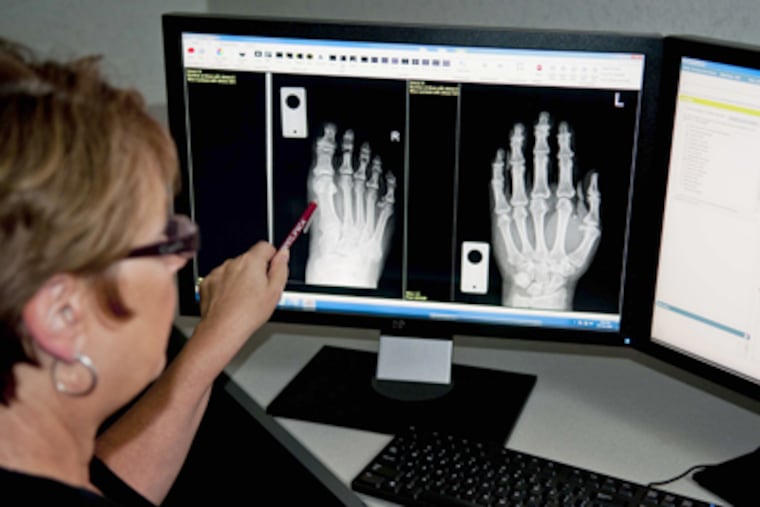Filling in the gaps as Big Pharma downsizes
Bucks software firm manages drug-trial data. And it's hiring.

BioClinica Inc. is a bit unusual these days in the region's pharmaceutical industry. It is hiring.
The company creates computer software to read and measure images, such as brain scans of tumors, and to digest the huge amounts of data related to clinical studies that drug companies sponsor.
The company had 522 employees at the end of 2011 and hopes to add 55 by year's end, with most of the current job listings pegged for headquarters in Newtown, Bucks County, and its site in Audubon, Montgomery County.
BioClinica is looking for computer-software folks and those with pharmaceutical or clinical-trials history, but it will also look at recent college graduates with less technical history.
"We do hire a few project managers right out of college," said Peter Benton, a division president at BioClinica. Benton worked in pharmaceuticals for Johnson & Johnson, but also in TRW's automotive sector and for General Electric, after getting a mechanical-engineering degree at Northeastern and a master's degree in business at Wharton. "We want people who want to learn, want to work hard, and are good communicators."
Big pharmaceutical companies are cutting jobs, often from areas that are not so-called core competencies, or in research where profit no longer seems assured.
Pharmaceutical companies often outsource the management of the drug trials to clinical-research organizations (CROs). Either the drug company or the CROs might outsource the software design and data management. BioClinica's largest shareholder is Covance Inc., a multinational CRO based in Princeton.
BioClinica certainly has competitors. Software firm Oracle Corp. has a health-care division and Philadelphia-area offices. So, too, do Medidata Solutions Inc., eResearchTechnology Inc., and Perceptive Informatics Inc.
BioClinica's chief executive officer, Mark Weinstein, said the company's clients had ranged from a six-person start-up to Pfizer Inc., which accounts for 18 percent of BioClinica's business.
"Big Pharma is changing, and small pharma comes and goes," Weinstein said. "At any point in time, we're working with close to 200 companies. But what changed for everybody is the business model. That is the whole issue of sticking to your core competencies and outsourcing everything else. We're saying we have a low-cost alternative to what you used to do in-house, and we come and go as you need our services. Big Pharma has had monolithic organizations with thousands of people and now is saying, 'I want only hundreds of people, but I need the same services, so where do I go?' "
MarketsandMarkets, a research firm, reported this month that the global market for clinical-trial-management software (CTMS) such as BioClinica's was $576 million in 2010, but would increase by a compounded annual growth rate of 14.5 percent from 2011 through 2016.
The U.S. market is growing because of greater need to prove that drugs are safe and more effective than existing treatments.
Pharma executives and their lobbyists often complain about requirements imposed by the U.S. Food and Drug Administration, which is supposed to check for safety and efficacy of products. But BioClinica benefits from such regulation and might do so in countries such as China and India as those nations want drugmakers to tailor products for them, with corresponding regulation.
Benton noted that BioClinica was able to capture images and data in many formats, but that its programs work through Microsoft's Outlook system, which is used in much of the world.
BioClinica, which will report 2011 fourth-quarter and full-year results in February, has acquired smaller firms in recent years.
The stock, which trades on the Nasdaq, closed Friday up 6 cents, or 1.19 percent, at $5.19.
BioClinica reported to the SEC that its revenue in the nine months ended Sept. 30 increased 10.6 percent to $61.5 million, compared with the same period in 2010.
The company took a $1.7 million charge in 2011, in part to pay severance costs for laid-off employees in its Netherlands office. That expense contributed to a decrease in net income from operations of 18.7 percent from the same period the previous year. Absent that cost, the net income from operations increased 26.3 percent.
Some of those eliminated positions in computer-oriented areas were brought home, and the company now expects to hire project managers in Europe as well as in this region.
The Audubon building has ping-pong and foosball tables, which seem essential for any tech company.
"I'm partial to foosball," Benton joked.
But he is serious about why BioClinica keeps its help desk in-house and staffed 24/7, albeit with a 200-language translation service with another company 30 seconds away by phone. While clinical sites almost always have Internet connections for receiving and transmitting data, sometimes, a voice is more effective at helping humans work through software issues.
"We have a lot of experienced people," Benton said, "and, in one sense, the folks on the help desk are talking to our real customers."
at dsell@phillynews.com, 215-854-4506, or @phillypharma
on Twitter. Read his blog at www.philly.com/phillypharma